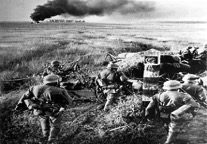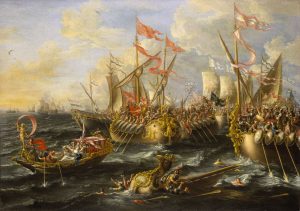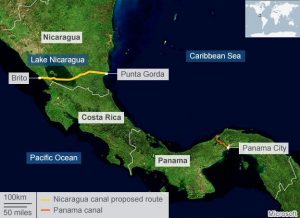Many things contributed to the fall of the Nazi Regime. People argue that Nazi ideals led to the failure of their plan for European dominance. Some say that it was the concept of “Lebensraum,” the need of living space for Germans, and others point out that the loss of World War II by Nazi Germany led to their downfall. All of these factors are true, but if we look deeper and focus in on some of the events that Nazi Germany took part in during World War II, we can pin the failed invasion of the Soviet Union, known as Operation Barbarossa, as one of the key contributing factors to the demise of Nazi Germany and everything the country stood for. This operation was an “all or nothing” operation, which meant that failure was not an option for Nazi Germany. Operation Barbarossa led to German Soldiers holding the fate of their country in their own hands as the very existence of Nazi Germany was at stake.1
In 1925 Hitler wrote the famous book Mein Kampf, which contained Hitler’s political beliefs and his plans for Germany. Hitler believed that Slavs were not part of the Aryan race, and he deemed them inferior. Mein Kampf emphasized the need for German living space, otherwise known as “Lebensraum.” To achieve this, the Germans would have to turn towards the East and focus on the Soviet Union, which would result in Hitler fighting a war on two fronts.2
The Germans began preparations as early as February 1941, anticipating that the invasion would commence during mid-May of 1941. However, due to the Balkan campaign, the date was pushed back to June 1941. The five-week delay shortened the time available to invade the Soviet Union. Hitler predicted a swift invasion, lasting only a few months, because of his rapid success in other parts of Europe. However, these successes led to Hitler being over confident, because he believed he was a political and military genius. Hitler didn’t anticipate war during the Soviet winter, and German soldiers lacked the adequate clothing and supplies to fight a war during the winter months. This would prove to be fatal to the German army as they were not prepared. On the other hand, the Soviets were also inadequately prepared. Although they had more numbers than their German counterparts, they lacked equipment or had poor quality equipment, and had worse training than the Germans. The quickly coming winter and with the Soviets lacking equipment and training, it was essential that the Germans achieved a quick victory.3

The initial offensive started June 22,1941. There were around four million German troops along with hundreds of thousands of Italian and Romanian troops. The Germans split themselves into three army groups, turning their focus to different parts of the Soviet Union. Army Group North would head to Leningrad, Army Group Center would head towards Moscow which was the Soviet capital. Army Group South would head south into Ukraine which was the center for Soviet industry and mining and had sufficient farmland for Hitler’s concept of “Lebensraum.” The Soviet south was also very rich with petroleum which was another deciding factor in the invasion. At first the invasion along the 1,800 miles took everyone in the Soviet army by surprise as the Germans were able to catch the Soviets unprepared.4
The first few weeks of the invasion were swift and fast, but by mid-July a series of rainstorms slowed the German advance deep in the Soviet Union. The rainstorms made the path treacherous for the Germans as the dirt and sandy roads turned muddy, making it difficult for German wheeled vehicles to advance. The Nazi Army made little progress with their offensive. Soviet troops would often do as much as they could to slow down the German advance, which included them burning crops, destroying bridges, and evacuating factories as they retreated. Furthermore, steel and munition plants in the West were destroyed and shipped to the East. The Soviets also destroyed most of their rail stock, depriving the Germans of use of the railroad system. Despite the Soviets doing everything in their power to slow the German attack, it still wasn’t enough, and by mid-July, the Germans had advanced more than 400 miles. The Germans were only 200 miles west of Moscow, the Soviet capital. There was still time to make significant advances before the onset of winter, but the opportunity broke down when Hitler and his generals had disagreements on where the German army would shift its focus to next. A quick victory was still essential to the German Army.5

Ultimately, after the Battle of Vyazma, which was a twenty-day battle that led to a German victory, the Germans had a clear path to Moscow. Moscow was not only the capital and largest city of the Soviet Union, but it was also one of the main military and political objectives for the Axis powers during the invasion. In early December 1941, the Germans were at the gates of Moscow with many of the troops exhausted and tired. Many of the Soviet forces were fresh, yet the Germans were so close to Moscow, it was hard to resist advancing to capture Moscow. Victory was in the Soviets’ sight, especially because of the onset of winter in the Soviet Union, which is one of the coldest countries in the world. The Germans suffered greatly during this harsh Soviet winter. The sub-zero temperatures were the most severe in decades. Frostbite decimated German troops, many of whom were already exhausted or had fallen ill due to the temperatures. Provisions were also not made for the German troops. They had very little clothing for the winter because Hitler and his generals thought the invasion would be swift. Many troops starved or froze to death. The freezing temperatures also immobilized many of the Germans’ transportation, artillery, and aircraft. In addition, many of the German supply lines were vulnerable to attacks from behind. Getting provisions to the troops up front was a difficult task for the Germans. The number of casualties the Germans faced were unheard of among the Nazis, as they barely had any losses in their previous campaigns during this war. The Soviets’ experience with the poor weather differed from the Germans. The weather was perfect for the Soviet Red Army as they were used to it and tended to fight better in freezing temperatures. 6

The turning point for Operation Barbarossa came as the drive to Moscow started to stall. The Soviets were poised for a counter offensive and were able to exploit the Germans when on December 6th, 1941, Gen. Georgy Zhukov of the Soviet Union launched a counter offensive against the Germans that the German army was never able to come back from. Many of the troops used in the counter offensive were Siberian troops who were very effective fighting in colder weather. This counter offensive drove the Germans away from Moscow and ultimately pushed them back all the way to Berlin. 7
So this leads back to the question of whether Operation Barbarossa was Hitler’s biggest failure that cost Nazi Germany World War II? The short answer would be yes, but to expand on this, we can see that Hitler and his generals made many mistakes and mishaps. Their goal to invade and overtake the Soviet Union was unrealistic from the beginning. The only reason why success seemed realistic was the fact that before Operation Barbarossa, Germany was dominating Europe and they weren’t experiencing any significant losses in these battles. The German Army was a war machine that was decimating their enemies. For this very reason Hitler and his generals grew overconfident. They were so confident they thought Operation Barbarossa wouldn’t be a long invasion and that there weren’t going to be many casualties. However, Hitler’s thinking was wrong. The Germans experienced more casualties on the Eastern front fighting the Soviets than they did on any other front. Overconfidence led Hitler to make irrational decisions for the German Army that made them not only lose the war, but also it led to a turning point in which Hitler would lose Germany as he knew it. Winter played a huge part as many of the German preparations were not geared towards fighting during the winter months. The Soviets were better suited to fight during the winter than the Germans. Without proper clothing, provisions, and other equipment needed to wage a war during the Soviet winter, Germany began to struggle towards their demise. Ultimately, Hitler was so obsessed with “Lebensraum” that he couldn’t grasp the consequences if he had failed. However, all of what Hitler had hoped for Germany would be gone by the time Germany fell to the Soviet Union.8
- Martijn Lak, “Operation Barbarossa and Germany’s Defeat in the East,” German History, Volume 29, Issue 2 (June 2011): 335–337. ↵
- H.W. Koch, “Operation Barbarossa-The Current State of the Debate,” The Historical Journal 31, no. 2 (1988): 388-390. ↵
- Britannica Encyclopedia, s.v. “Operation Barbarossa,” by John Graham Royde-Smith. ↵
- David M. Glantz, Operation Barbarossa:Hitler’s Invasion of Russia 1941(The History Press: Stroud, UK, 2011), 31-42. ↵
- Wikipedia, 2018, s.v. “Operation Barbarossa.” ↵
- Wikipedia, 2018, s.v. “Operation Barbarossa.” ↵
- Britannica Encyclopedia, s.v. “Operation Barbarossa,” by John Graham Royde-Smith. ↵
- Robert Smith Thompson & Alan Axelrod, Nazi Germany(New York;2018), 240-251. ↵



53 comments
Jennifer Salas
This article was very interesting, I never heard about Operation Barbarossa until I read this article. This isn’t the first time someone has failed invading Russia, they tend to forget about the harsh winter that they have. It was a huge mistake and failure for Hitler to send troops in the cold weather. It’s crazy how weather had a huge impact on the outcome of this invasion.
Devin Ramos
In high school in history class when we learned about world war two, I was never taught about operation Barbarossa and I love history so when I did learn about this through youtube I watched two documentaries on it and was so interested in the operation. To me, if Hitler had not gone through with the plans of the operation and instead invested all of the resources that he used and went to take down great Britain the history we know of today could have been very different.
Michael Hinojosa
I feel like in my world history class in high school there was mention of the Operation Barbarossa that the Nazi German tried to execute but since it was never really explained in depth I always thought it was a minor event in a much larger scheme of things. But after reading this article it’s evident that it had a much larger impact than I had originally thought before, so reading this article really cleared up a bunch of questions I had before!
Peter Coons
While it is true that Operation Barbarossa was the definitive turning point in the war for the allies, the planned siege of Moscow was not the event that would lead to the German army making the mass retreat to western Europe. That would come at the titular Battle of Stalingrad, where sieging German forces became besieged by Red Army relief forces and proceed to obliterate the majority of Army Group North. With the wholesale slaughter of Germans there, moral would deteriorate among the remaining troops and officers would defy Hitler’s orders to fight to the last man. Stalingrad, rather, was the battle in the Russian theater that destroyed the German’s fighting strength.
Dylan Coons
I always found it hilarious that whenever world leader wants to take over Russia, they do it in the winter. Not only that but the invading force never even tries to prepare for the winter. You would think that Hitler would take a hint from Nepoloian’s failed invasion. If you’re going to pick a fight with a country that has no problem sending thousands of bodies at you and burning down their own towns to stop you from gaining resources when they retreat, then you might want to do it when no one will die from freezing.
Andrea Cabrera
I recall I have heard or read about Operation Barbarossa. In past history courses, we have discussed how the weather can affect soldiers in different periods of time when they are not prepared for it. Also as some others have shared before I wonder how different would the war would have been if Hitler had not attempted to attack the Soviet Union. Can you imagine the different history lessons we could have had? The winner always tells the story.
Max Lerma
This was a brilliant historical article. I had heard of this failed campaign, but had never known what it was called by the Germans. I believe that this is another classic example of one’s hubris leading to one’s downfall. Adolf Hitler planned this poorly and you do a great job in explaining just how he failed to plan this assault out. Thank you for this article and for helping your audience gain a better understanding of this period’s military history.
Jose Sanchez
History has shown that the invasion of Russia will always end in failure and will be very costly. The Mongols have failed, Napoleon also failed, and so did Hitler. The Russian winter is cruel and unforgiving and has been the demise of any who have tried to invade Russia. It was perhaps his biggest mistake as the article explained. Overall, this article was very informative and well written.
Christopher Vasquez
It’s strange to think that Hitler, believing that he was a military genius, would risk his entire regime on one gamble: Operation Barbarossa. Hitler’s arrogance and ignorance prevented his foresight to prepare his soldiers with winter clothes. Had Hitler not forgotten about winter and had he adequately prepared his men, I wonder where we would be in history right now.
Dylan Sanchez
Such a great explanatory article. I always wonder just how different would the war would have been had Hitler not even attempted to attack the Soviet Union. Perhaps he got too cocky due to the fact that the Soviets had little to no equipment at the ready. I thought it was fascinating that the Soviets destroyed their own factories and railways in order stop the germans. They have been doing that since Napoleon’s days of fighting.
Lindsey Wieck
Have you ever watched Man in the High Castle, Dylan? It creates an alternate world where the Allies didn’t win WWII. You might enjoy it.